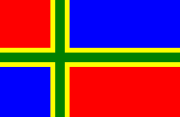Folkspraak
| Folkspraak | |
|---|---|
 | |
| Created by | Collaborative work |
| Date | 1995- |
| Users | small internet-based groups |
| Purpose | |
| Latin | |
| Sources | Vocabulary, phonology and grammar from Germanic languages |
| Language codes | |
| ISO 639-3 | None (mis) |
| Glottolog | None |
Folkspraak is an incomplete zonal constructed language based on modern West and North Germanic languages and intended to be easy to learn for any native speaker of a Germanic language, making it suitable to be a sort of lingua franca amongst the Germanic languages community.[1]
The project's development took place mostly online in a Yahoo group, though disagreements about grammar and orthography means that there are several different versions or "dialects".[1] Disagreement occurs even over which source languages to use, so that only some developers draw from Frisian, Low German and Norwegian Nynorsk, next to the usual source languages of English, Dutch, German, Danish, Norwegian Bokmål, and Swedish.[1]
Phonology[edit]
Data from: Omniglot
Consonants[edit]
| Labial | Coronal | Dorsal | Laryngeal | |||
|---|---|---|---|---|---|---|
| Nasal | m | n | ŋ | |||
| Stop | Voiceless | p | t | k | h | |
| Voiced | b | d | ɡ | |||
| Fricative | Voiceless | f | s | ʃ | x | |
| Voiced | v | z | ||||
| Affricate | ts | tʃ | ||||
| Approximant | ʋ | l | j | |||
| Rhotic | r | |||||
Vowels[edit]
| Front | Back | ||
|---|---|---|---|
| Close | Unrounded | iː | |
| Rounded | yː | uː | |
| Mid | Unrounded | eː | |
| Rounded | øː | oː | |
| Open | ɑː | ||
| Front | Back | ||
|---|---|---|---|
| Close | Unrounded | ɪ | |
| Rounded | ʏ | ʊ | |
| Mid | ɛ | ɔ | |
| Open | a | ||
Orthography[edit]
Folkspraak alphabet is identical to the ISO basic Latin alphabet. Double consonants and consonant groups signalize short vowels. The ⟨c⟩ represents /s/ in front of front vowels (⟨e i y eu⟩) and /k/ in any other position. The digraphs ⟨th⟩ and ⟨ph⟩ represent the same pronunciation as ⟨t⟩ and ⟨p⟩, respectively. ⟨sk⟩ is pronounced /ʃ/.
Grammar[edit]
Morphology[edit]
Folkspraak has no adjectival or verbal variation. Nouns made from adjectives as well as infinitives end in -e as in de andere ('the other') and have ('to have'). There is no distinction between adjectives and adverbs.
There is no grammatical gender or cases except with personal pronouns: si ('she'), hi ('he'), ik ('I'), mi ('me').
The plurals of nouns are made with -e or, if a noun ends with an unstressed syllable, with -s. Mann (man), manne (men), auto (car), autos (cars).
Syntax[edit]
The basic word order is subject–verb–object (SVO). Questions are made by inversion to VSO.
Samples[edit]
The Lord's Prayer in several Folkspraak varieties/dialects:[citation needed]
| Folkspraak | Folksprak | Middelsprake | Boksprak | Fůlkspræk |
|---|---|---|---|---|
|
|
|
|
|
See also[edit]
Notes[edit]
- ↑ 1.0 1.1 1.2 Folkspraak at omniglot.com
External links[edit]
- Folksprak.org - containing information like grammar, vocabulary and a wiki
- Folkspraak Omniglot page
- English-Folksprak dictionary
- Folkspraak on Wikibooks
This article "Folkspraak" is from Wikipedia. The list of its authors can be seen in its historical and/or the page Edithistory:Folkspraak. Articles copied from Draft Namespace on Wikipedia could be seen on the Draft Namespace of Wikipedia and not main one.
